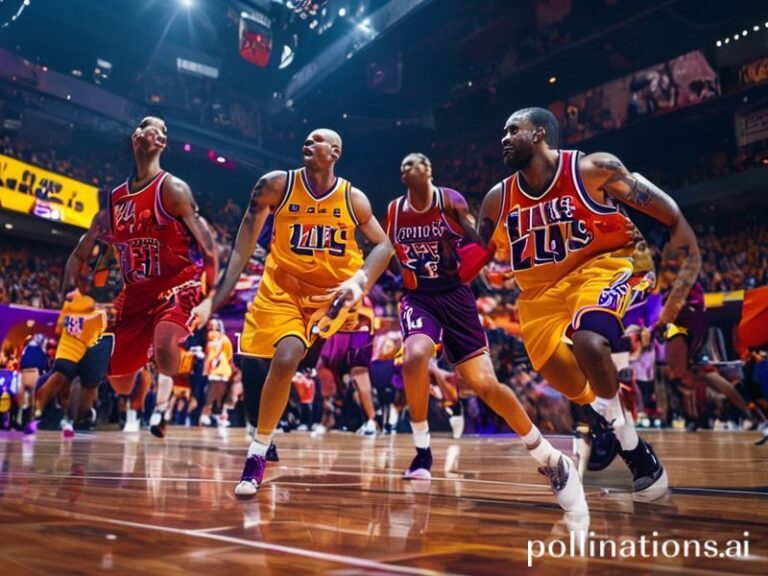Bow Ties & Bombshells: How Ken Rosenthal Became the Planet’s Most Unlikely Global Emissary
The Ballad of Ken Rosenthal: How a Bow-Tied Oracle in Short Pants Explains a Fractured Planet
Somewhere between the seventh-inning stretch and the next geopolitical implosion, Ken Rosenthal keeps polishing his spectacles. To the uninitiated, the 61-year-old MLB Network insider is merely the man in the two-tone bow tie who knows which free-agent outfielder the Padres are about to overpay. To the rest of us—citizens of an overheated world that can’t decide whether to play ball or burn the stadium down—Rosenthal is a living, tweeting metaphor for the fragile infrastructure of truth.
Let’s zoom out. From Nairobi to Naples, the global information pipeline is hemorrhaging credibility. Yesterday’s “exclusive” is today’s deleted tweet; tomorrow’s scoop arrives pre-canceled. Against that backdrop, Rosenthal’s three-beat reporting cadence—tip, corroborate, publish—looks almost quaint, like a telegraph operator refusing to abandon his post while the rest of us scream into TikTok. His scoops travel at the speed of light, yes, but they still stop at red lights and signal before turning. In 2024, that’s practically Geneva Convention behavior.
The international reader may ask why a bald American scribbling about baseball’s transaction wire merits column inches in a world busy measuring radiation levels in the Baltic. Fair question. Consider Rosenthal’s latest coup: breaking the Shohei Ohtani $700-million deal while on vacation in, of all places, Florence. There he was, standing in the shadow of Brunelleschi’s dome, thumb-typing news that ricocheted across Tokyo stock tickers, Seoul sports cafes, and Los Angeles talk-radio septic tanks within minutes. One man, one phone, one bow tie—yet the aftershocks rattled currencies, fantasy-league rosters, and the self-esteem of 29 other front offices. If that’s not soft power, I don’t know what is.
But power curdles quickly these days. Last winter, MLB Network abruptly fired Rosenthal during the lockout after he reported stories the league preferred left in the dark. The irony was thicker than a humid Wrigley afternoon: the reporter who’d fed the beast for decades got devoured by it. Global parallels abound—journalists jailed in Myanmar, dismembered in consulates, shadow-banned in Silicon Valley boardrooms. Rosenthal landed at The Athletic within hours, proving that talent still has exit visas even when conscience does not. Still, the episode served as a reminder: if the house always wins, the press box sits alarmingly close to the gift shop.
Overseas audiences sometimes scoff at baseball’s obsession with minutiae—why does anyone care whether a utility infielder’s option vests at 325 plate appearances? Yet swap “utility infielder” for “junior coalition partner” and “plate appearances” for “parliamentary votes” and suddenly the stakes feel familiar. Rosenthal’s granular jargon mirrors the granular jargon of bond yields and trade clauses; both are liturgies recited by cloistered acolytes while the congregation pretends to understand. The difference is that Rosenthal’s cult still believes in arithmetic.
There’s also the matter of scale. When Rosenthal tweets that the Yankees have acquired yet another reliever with a 98-mph cutter, the news pings 14 time zones in less time than it takes a Sri Lankan tea picker to earn a dollar. The planet’s attention span is now engineered to the cadence of waiver-wire alerts. Somewhere in a Lagos cybercafé, a teenager learns about American labor arbitrage by watching a short man in glasses explain arbitration salaries. Call it sabermetrics as soft diplomacy; call it late-stage capitalism in cleats; just don’t call it boring.
We end, as all things do these days, with mortality. Rosenthal recently underwent surgery for a thyroid issue; the scar bisects his neck like a seam on a baseball. He joked on air that doctors “finally found a way to shut me up.” The gallows humor landed everywhere from Toronto to Taipei because we all recognize the punch line: the voices we rely on to narrate the game are, in fact, mortal. When they go quiet, we’re left alone with the crowd noise—an increasingly unhinged soundtrack of conspiracy theories and drone strikes.
So here’s to Ken Rosenthal: the bow-tide against the rising tide. May his sources stay human, his wi-fi stay unfiltered, and his neck stay stitched. The world may not run on box scores, but it certainly rhymes with them.







